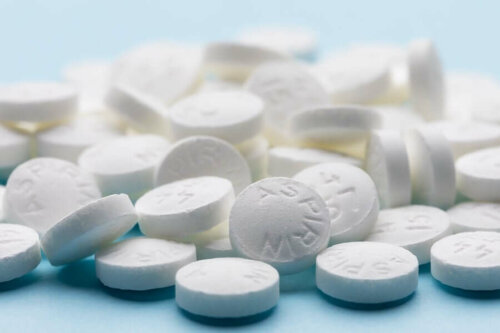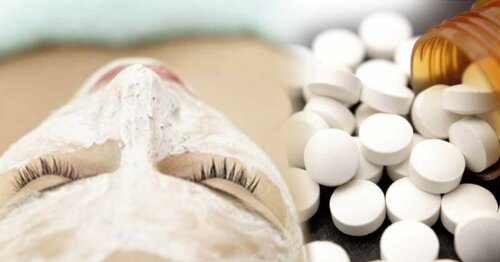Four Aspirin Based Masks for Perfect Skin


Reviewed and approved by the doctor Karla Henríquez
Aspirin face masks emerged as an at-home alternative to improve skin health. Its main ingredient, acetylsalicylic acid (known for its vasoconstricting effect when ingested), could help relieve inflammation and tackle blemishes.
Below we’ll tell you more about this element and how to make aspirin based masks. We’ll also tell you what the experts say and give you some recommendations.
What you should knows before you use aspirin based masks
According to Consenso de Medicina Cutánea Ibero-Latino-Americana, topical salicylic acid relieves acne by reducing swelling and redness and opening clogged skin pores.
In order to take advantage of salicylic acid, you must take some precautions when making and applying these masks to your face. Thus, visit a dermatologist for a check-up and follow their indications. Additionally, keep the following in mind:
- Always do an allergy test before using any of these masks. Make the mixture and apply a little bit of it on a hidden part of your arm. Allow it to act for five minutes, watch how your skin reacts, and rinse with plenty of water afterward.
- Use uncoated aspirin, as some believed the coating could affect the result.
- Never use these masks with aspirin if you’re allergic to this drug.
- Don’t use these masks and follow any prescribed treatment if you have sensitive skin, dermatitis, psoriasis, or any other skin disease.
Check out How to make an aspirin-honey face mask
Recipes for aspirin based masks
Now you know the benefits of aspirin masks and the precautions and tips to take into account before using them, it’s time to learn the recipe.
1. Basic recipe

This is the basis for most of the popular aspirin face masks.
Ingredients
- 10 aspirin tablets, uncoated
- 5 tbsp. of water (75 ml.)
Preparation
- Firstly, add the aspirin to the water
- Then, wash and dry your face
- Then, crush the aspirin and form a paste
- Apply to clean skin and leave it on for a few minutes
- Finally, rinse with warm water and dry
2. Aspirin based mask for oily skin

The second of the aspirin masks includes a touch of tea tree oil, which can reduce excess skin oil and blemishes.
This oil can be very aggressive for certain skin types though. This is why it’s important to be cautious when using it. Always dilute it in water and only use a couple of drops (if authorized by your dermatologist).
Ingredients
- 8 aspirin tablets
- 4 tbsp. of water (60 ml.)
- 2 drops of tea tree oil
- 2 drops of extra virgin olive oil
Preparation
- Firstly, make a paste, like in the first recipe, and add the tea tree oil
- Then, apply it to clean skin and let it sit for a few minutes
- Finally, rinse and repeat three times a week
3. Aspirin based mask (for dry skin)
Starting with the basic recipe at the beginning, here we’ll just add a little olive oil to hydrate your skin and bring back its softness.
Ingredients
- The basic recipe (first one above)
- 1 tsp. of extra virgin olive oil (5 g.)
Preparation
- Firstly, mix all the ingredients and apply the mask to clean dry skin
- Then, leave it on for a few minutes and then rinse with warm water
Find out How to make a homemade sunscreen
4. Moisturizing aspirin based mask (for mixed skin)

Ingredients
- 10 aspirin tablets, uncoated
- 2 tbsp. of organic honey (50 g.)
- 2 tbsp. of aloe vera gel (30 g.)
Preparation
- Firstly, incorporate the aspirin and the honey and mix them with a spoon
- Crush the aspirin in a separate container
- Then, add the aspirin powder to the previous mixture and a little water and mix again to a homogeneous mixture (you could also process it all with a mixer or blender
- Apply it to the clean, dry face
- Finally, rinse it off
Pay attention to your skin type before you use aspirin based masks
The best thing you can do to improve the health of your skin is to consult a dermatologist and follow their instructions. Keep in mind that every person has different needs and that you must choose what’s best for daily care or treatment of imperfections and specific issues.
All cited sources were thoroughly reviewed by our team to ensure their quality, reliability, currency, and validity. The bibliography of this article was considered reliable and of academic or scientific accuracy.
Arif T. (2015). Salicylic acid as a peeling agent: a comprehensive review. Clin Cosmet Investig Dermatol. 8: 455–461. doi:10.2147/CCID.S84765
Green, G. A. (2001). Understanding NSAIDs: From aspirin to COX-2. Clinical Cornerstone. https://doi.org/10.1016/S1098-3597(01)90069-9
Lores, A. J. (2000). La aspirina. Carta de La Salud.
Sánchez Alonso, F.; Gómez La Mayor, P. (2000). Bases para la atención farmacéutica del acné vulgar. Madrid: Ed. Díaz de Santos.
This text is provided for informational purposes only and does not replace consultation with a professional. If in doubt, consult your specialist.








